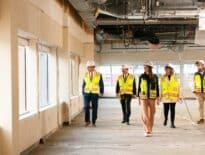Boston Planning & Development Agency directors opened a fast lane to approval of decarbonization projects at municipal properties, including an estimated $1.2 billion to remove fossil fuel systems at public housing.
At the board’s meeting Thursday, directors also approved the rezoning of the industrial Newmarket district and approved a 229-unit housing development at the Whole Foods Market property in Brighton.
Mayor Michelle Wu signed an executive order in 2022 to fast-track approvals of projects containing at least 60 percent income-restricted housing units.
To comply with the policy, the BPDA approved a zoning code change that waives the Article 80 permitting review for certain renovation projects that preserve or create affordable housing, and don’t have adverse effects outside the property. The changes are designed to minimize costs related to a lengthy permitting review, BPDA Deputy Director of Comprehensive Planning Caitlin Coppinger said.
Kenzie Bok, the former city councilor named BHA administrator in April, said the agency estimates the cost of replacing fossil fuel building systems at over 12,000 public housing units by 2030 at $1.2 billion. Federal funds from the Inflation Reduction Act could offset the local cost.
“I’d be lying if I didn’t say the scale of what we’re doing is enormous,” Bok said.
Holocaust Museum, Grocery Redevelopment OK’d
In Brighton, Kimco Realty Corp. received approval for a 394,637-square-foot redevelopment of a 2.3-acre retail property at 15 Washington St. anchored by a Whole Foods Market.
The existing 20,350-square-foot Whole Foods Market will be rebuilt as a 43,459-square-foot store on the west side of the property fronting on Washington Street. A 5-story building on the east half of the property will include 229 housing units, 18 percent of which would be income-restricted, and ground-floor retail.
Board members also approved rezoning the Newmarket district to preserve the current industrial and creative clusters, while leaving flexibility to attract emerging business sectors.
The Newmarket 21st Century Industrial District breaks up the neighborhood into three categories. The highest density is allowed in the Gateway Industrial district, with building heights up to 140 feet in 8-story buildings, potentially attracting emerging industries in mixed-use developments combining industrial, R&D and office space.
The core industrial district allows lab, office and R&D uses in 5-story buildings. And the creative industrial district in the southwest corner includes studio, theater and concert hall uses, also in maximum 5-story buildings.
Newmarket business leaders say the recent removal of the homeless encampments in the Mass & Cass area at the northern edge of the neighborhood will ease concerns about public safety that have deterred investment in recent years.
Lastly, directors also approved include a new museum about the Holocaust located on Tremont Street in downtown Boston. The Holocaust Legacy Foundation plans a 33,000-square-foot, 6-story structure designed by Schwartz/Silver Architects of Boston across the street from Boston Common.









